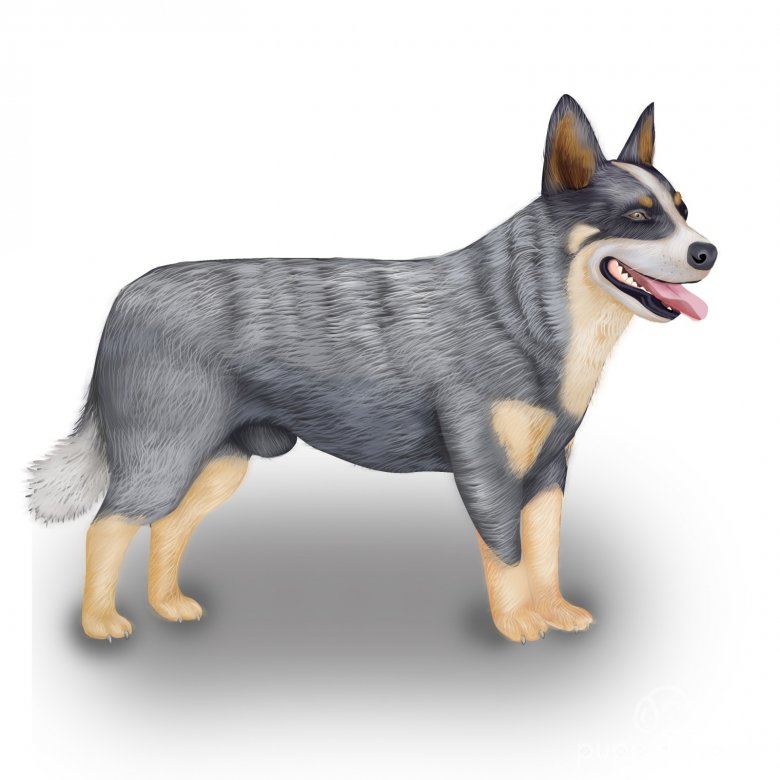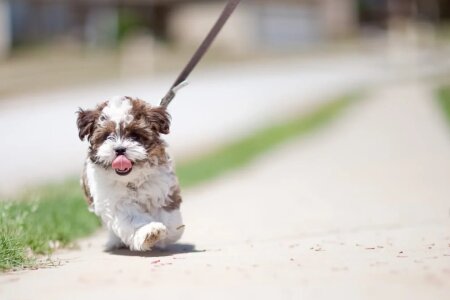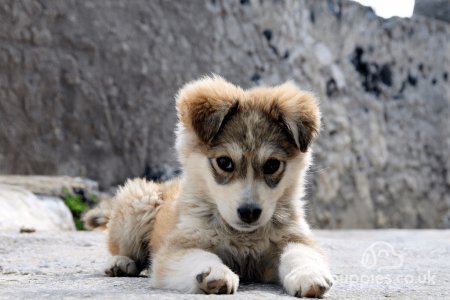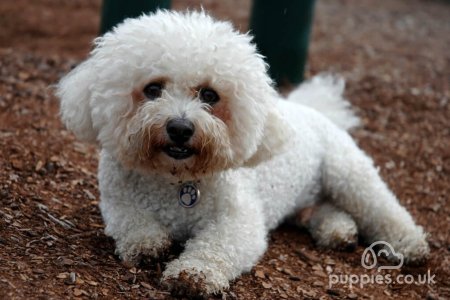Australian Cattle Dog (Australian Heeler, Queensland Heeler, Blue Heeler)
Overview
An Australian Cattle Dog is a high energy, exceptionally talented and intelligent herding dog. The breed has dingo ancestry and was developed by Australian settlers in the 19th century to help herd cattle on ranches. Australian Cattle dogs are loyal, courageous and love nothing more than participating in family activities and jobs. As a working dog, the Australian Cattle Dog needs a lot of physical activity and mental stimulation to keep them happy. This medium-sized dog is sturdy and compact with a strong head, upright ears and a blue or red speckled straight short coat.
Physical Appearance
The Australian Cattle Dog is a powerful, evenly-proportioned dog with strong teeth and powerful jaws. They have medium-sized pricked ears, a curved, broad head and oval brown eyes that express curiosity and intelligence. These cattle dogs have long, bushed tails that hang down. Their legs are strong and their paw pads are tough allowing them to travel long distances with ease.
These cattle dogs have a weather-resistant double coat that is short, dense and has a bristly texture. You will see these dogs with either a red or blue speckled or mottled coat with shades of red, blue, white, grey or black included. Every ACD has a slightly different coat making them all unique and striking.
How big do Australian Cattle Dogs get?
Character Traits
The Australian Cattle Dog is loyal, affectionate and smart. As a working dog, it is no surprise ACDs have boundless energy so require lots of exercise and mental stimulation. These cattle dogs like to participate in interactive games and enjoy training, they hate to be left alone and can quickly become bored which often leads to destructive chewing. Australian Cattle Dogs are quick learners and need consistent training to prevent them from becoming independent and stubborn.
Due to the nature of the Australian Cattle Dog’s job, they tend to nip when they are excited. This comes from them nipping at the heels of cattle during herding, one of the reasons these dogs are also known as “Heelers”.
An Australian Cattle Dog is not the right breed for apartment living but for anyone with an active lifestyle, a farm or a lot of outdoor space these dogs will be right by your side. They are protective and tend to be reserved around strangers but they are devoted to their families. Early socialisation is important for an Australian Cattle Dog puppy
Are Australian Cattle Dogs intelligent? Yes, they are highly intelligent (5/5).
Are Australian Cattle Dogs affectionate? Yes, they are extremely affectionate with family and don’t like being alone (5/5).
Do Australian Cattle Dogs have high or low energy levels? High energy levels (5/5).
Are Australian Cattle Dogs loyal? Yes, they are loyal to their owners.
Are Australian Cattle Dogs playful? Yes, they particularly love playing interactive games.
Are Australian Cattle Dogs aggressive? Not generally but they may show aggression to other dogs.
Are Australian Cattle Dogs easy to train? In experienced hands, yes.
Are Australian Cattle Dogs good guard dogs? Yes, thanks to their protective and alert nature.
Ability to Socialise
An Australian Cattle Dog is an excellent family pet, they are more interested in being with their family than around other dogs. If you bring your ACD up around other animals they will get along with them but their territorial nature means they will likely be aggressive towards unknown dogs. Socialising your Australian Cattle Dog puppy early will help to ensure they grow up to be well-rounded.
Do Australian Cattle Dogs get along with other pets? They will tolerate other pets that they have grown up with. As Australian Cattle Dogs have a high prey drive it is best to avoid any interaction with smaller animals.
Do Australian Cattle Dogs get along with other dogs? No, they can be territorial and aggressive to unknown dogs.
Are Australian Cattle Dogs good with kids? Yes, they are good with children but should always be supervised as they can nip when excited.
Are Australian Cattle Dogs good with strangers? They are usually wary of strangers.
Lifestyle Suitability
An Australian Cattle Dog will enrich your life and become the ultimate partner for adventures but they cannot live in an apartment or confined space. This is an outdoor dog that suits being in the countryside rather than the city, the more space the better. Remember that the Australian Cattle Dog is a working dog with huge amounts of energy, they like to be kept busy and stimulated. This means this is not a dog you can leave at home while you go to work.
Are Australian Cattle Dogs good for first-time owners? No, Australian Cattle Dogs are working dogs with high energy needs. They need to be trained, handled and socialised by an experienced, confident owner.
Are Australian Cattle Dogs hypoallergenic? No, they shed heavily twice a year.
Are Australian Cattle Dogs prone to drooling? No.
Are Australian Cattle Dogs a good breed for apartment living? No, this is a dog that requires huge amounts of space and exercise.
Do Australian Cattle Dogs shed a lot? They shed moderately with higher levels of shedding twice a year.
Do Australian Cattle Dogs bark a lot? No, but they will bark at strangers or to protect their territory.
Can Australian Cattle Dogs be left alone at home? No, being left alone will lead to boredom, loneliness and destructive behaviour (namely chewing).
Can Australian Cattle Dogs handle the heat? Yes.
Can Australian Cattle Dogs handle cold temperatures? Yes.
Are Australian Cattle Dogs sensitive to loud noises? Not particularly but noise should be kept down when there is a puppy in the house.
General Health & Health Issues
Australian Cattle Dogs are known for being robust, healthy and long lived. With that said, there are a few health conditions they are prone to suffer from. This is mostly due to their small gene pool and includes:
Hip Dysplasia - This is a condition that means the thigh bone and hip joint don’t fit together as they should. This can cause pain and lameness in the dog’s rear legs. The best way to diagnose hip dysplasia is with a X-ray. Long term care can include physiotherapy, hydrotherapy and join supplements.
Elbow Dysplasia - This is a degenerative joint condition that is the result of poor development. This will eventually lead to arthritis but symptoms can be treated with pain relief, controlled exercise, rest and sometimes surgery.
Progressive Retinal Atrophy (PRA) - This is an eye disease that causes the retina to gradually deteriorate. This can begin with night blindness but can progress to complete loss of sight.
Congenital Deafness - This condition is inherited and puppies can be tested for it at a young age. Dogs with congenital deafness should not be bred.
How long do Australian Cattle Dogs live? - 12-16 years
Exercise & Play Time
Australian Cattle Dogs are high energy dogs that need at least 2 hours of exercise each day. They are well suited to long hikes, purposeful activities and running in large open spaces. A leisurely walk around the block is not going to be sufficient for this breed. If you have an outdoor job where your Australian Cattle Dog could join you they would love this. Properly trained Australian Cattle Dogs have good recall so can be walked off lead (but only do this if your dog is obedient).
How much exercise does a Australian Cattle Dog dog need? - At least 2 hours per day
Do Australian Cattle Dogs like water play? Yes, many love water and enjoy swimming.
Nutrition & Feeding
An Australian Cattle Dog is an extremely hardy dog that can live on a small amount of food, due to this they can put on weight quickly if they eat too much or don’t exercise enough. It’s best to feed your Australian Cattle Dog a high quality dry food.
A ACD puppy needs between 150 - 360g dry food a day split into several small portions. The amount you feed will depend on a number of factors including your dog’s size, age, build and activity level. The below is a rough estimate so ensure you have a personal dietary plan made for your dog.
Are Australian Cattle Dogs prone to weight gain? Yes, ACDs have a high potential for weight gain.
How much should I feed a Australian Cattle Dog puppy? 150 - 360g of high quality dry food split into 3-4 meals (for 2 - 12 months old).
How much should I feed an adult Australian Cattle Dog dog? 175 - 325g of high quality dry food split into 2 meals (the exact amount will depend on weight and activity level).
Care & Maintenance
Grooming: An Australian Cattle Dog has short, sleek fur. As they have a double coat weekly brushing is needed to remove dead hair and keep your Australian Cattle Dog looking their best. Twice a year your Australian Cattle Dog will shed a lot of fur so during this time more frequent brushing will help remove the clumps. You’ll only need to bath your ACD when they smell bad so that shouldn’t be too often.
Emotional care: Keeping an Australian Cattle Dog happy involves both physical activity, mental stimulation and company (they want to be with you). If you don’t provide this then your Cattle Dog is going to become frustrated, bored and even lonely, this can lead to destructive behaviours. In the case of the Australian Cattle Dog usually means being destructive through chewing.
History of the Australian Cattle Dog
The history of the Australian Cattle Dog is diverse and fascinating. Since the 19th century Australian Cattle Dogs have been used in Australia to help ranchers herd wild cattle.
British Smithfields were originally being used but they couldn’t tolerate the temperatures and terrain. In response to this, breeders mixed Smithfields with a feral breed, dingoes and Scottish Highland collies. Later, Dalmations were also used which is why most Australian Cattle Dogs are actually born white and develop their distinctive patterns as they mature. All of this breeding has resulted in what we now know as the Australian Cattle Dog.
While still a highly active working dog, many families have also brought the Australian Cattle Dog into their home. As long as ACDs get enough exercise and mental stimulation they make loving and loyal pets.
Interesting Facts About Australian Cattle Dogs
The oldest dog ever (according to the Guinness World Records) was an Australian Cattle Dog named Bluey (aged 29 years and 5 months)
Their double coat sheds twice a year
They are descended from dingoes
Australian Cattle Dog puppies are born white
Getting a Australian Cattle Dog Puppy
Buying a puppy is a big step and one of the easiest ways to connect with breeders is online. Use our buying guide to help you prepare for finding and buying your new dog. It is very important to be aware of scams, as puppies cost a lot of money people try to take advantage of this.
To help make the process easier and safer for you, Puppies vet breeders to ensure they are responsible. You can see if there are any Australian Cattle Dog puppies available in your area here.
How much does a Australian Cattle Dog cost to buy? - £1500 - £3000
How much does a Australian Cattle Dog cost to feed? - £50 - £60 per month
How much does insurance for a Australian Cattle Dog cost? - Around £50 per month
If an Australian Cattle Dog sounds like the right breed for you, you may also want to consider rescuing. A good place to get more information on rehoming is your local rescue centres. These associations may be able to help you in your search too:
https://australiancattledogsociety.co.uk/rescue/
https://www.acdra.org











